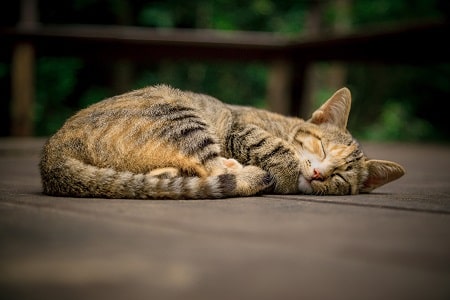Cats can have schizophrenia, yes. To be exact, the cat’s schizophrenia is not called schizophrenia. It’s called hyperesthesia syndrome, but the symptoms are quite similar. The symptoms might be mood swings or aggressivity, but there are more of them.
Although they are animals, felines can also suffer from mental conditions. Such conditions include schizophrenia.
It may now be quite visible since they don’t communicate with us the way we do with other humans.
However, such a condition affects how they react to us.
Contents
Schizophrenia in cats
Schizophrenia in cats has some similarities with the one in humans.
The term schizophrenia links more to humans. This condition in cats is what we call Feline hyperesthesia syndrome or FHS.
In humans, schizophrenia is a severe mental illness that affects how one thinks, feels, and behaves.
It has similar effects to felines, but it can be quite challenging to decipher since they act on instinct.
FHS, like schizophrenia, affects both male and female felines. Further, it usually starts in the early adult stage.
Thus, felines that get affected behaves differently. At the same time, they would also have different thinking and feeling capacity.
Many vets have theories as to why such a condition happens in felines. Some say it’s due to abnormal electrical activity in their brain.
Others say it gets triggered by stress or some obsessive-compulsive disorder. Lastly, some believe it’s a combination of all these things.
It is quite difficult to tell such a condition on cats since they are animals acting on instinct.
Nevertheless, there are specific ways to know if your cat has such a condition or not.
Related – Can a cat catch a cold from a dog?
How do I know if my cat has schizophrenia?
If your cat has schizophrenia, it will feel, think, and act differently.
At the same time, some symptoms may show that your cat is suffering from FHS.
Thus, if you think your feline pet is acting differently, you may want to check if it shows some of these symptoms:
- Extreme and frantic grooming behavior
- Dilated pupils
- Tail fixation
- Hyperactivity
- Aggressive behavior
- Being more vocal than usual
- Appearing to hallucinate
- Unusual sensitivity to touch in the spinal area
- Mood swings
- Seizures
Although it’s usual for felines to be irrational, the ones with FHS exceed such behaviors.
Cats with this condition show bizarre behaviors. They can lack activity, suddenly freezing without any extra movement.
On the other hand, such a condition can also make felines more aggressive than usual.
Thus, they often become dangerous pets.
You May Also Read – Can humans get ear mites from cats?
Are cats with schizophrenia dangerous?

Aggression due to schizophrenia can lead to intentional and severe bites and scratches.
Since felines would lose orientation with their owners, they can also have the intent to attack.
Although cats won’t intentionally attack us, owners, we often end up being the object of aggressiveness.
Such a condition can happen to all felines, even with the indoor ones. Experts call this redirected aggression.
Since they lose orientation, felines with this condition often become dangerous.
These instances can happen mainly if your pet gets triggered by a small animal.
Since they are playful by nature, they get easily stimulated by moving animals.
As they fail to hunt, they need something or someone to vent their frustration out. After that, they’ll be good as new.
Why your cat touches your face during sleep? Learn more here.
How to cure a cat’s schizophrenia?
Schizophrenia in cats often requires medical attention by veterinarians.
Since it’s a mental condition, felines don’t need extensive treatment. The following may not directly affect your pet, but it can lessen the symptoms.
According to a study, treatments in such a condition should point towards reducing their anxiety and stress. Here are some things you can do to help your feline pet:
Schedule Feeding and Playing Time
A scheduled feeding and playing period help keep your cat relaxed and well-exercised.
If your cat gets stressed out most of the time, a routine will help train its mind.
Avoid Irritating and Over-Stimulating Activities
While physical exercise is good, some types can cause irritation and overstimulation.
Avoid letting your pet do intense activities such as long runs and long playing time.
As a general rule of thumb, maintain your pet’s exercise in moderation.
Serotonin-enhancing Drugs
Some vets would prescribe a serotonin-enhancing drug. Serotonin is beneficial in the emotional well-being of humans, and it can also help cats.
These kinds of drugs work by stabilizing a cat’s mood. It can also prevent seizures and inflammations in them.
Gabapentin Drugs
Gabapentin is a drug containing pain-relieving and anti-seizure properties. Such a drug is useful in treating such mental conditions.
Still, drug-usage needs consultation, prescription, and approval of vets.
Does your cat sound like a pigeon? Read more about it here.
Can cats have other mental disorders?
Aside from schizophrenia or FHS, cats can also suffer from other mental disorders.
Still, it’s quite challenging to know or diagnose these disorders in felines since we know they can show different behaviors all the time.
Other disorders include the following:
Autism
Autism in cats likely affects 4 of their behaviors. These are their intelligence, senses, vocalizations, and hate for social interaction.
It’s quite challenging to decipher since all these behaviors usually happen in felines.
Bipolar Disorder
At the same time, felines can have bipolar disorder. As a result, cats can also have similar symptoms to humans.
These signs include unusual shifts in mood, energy, and activity levels. They would also lose concentration and the ability to carry out day-to-day activities.
ADHD
ADHD or Attention deficit hyperactivity disorder can also happen in felines. This condition can cause above-normal levels of hyperactive and impulsive behaviors.
Dementia
Dementia in cats is as feline cognitive dysfunction. This condition refers to a gradual decline in cognitive abilities. Further, it comes from aging-related changes in the brain.
Cat Anxiety
This condition frequently causes the development of destructive behaviors from your feline pet. It can include furniture scratching and clawing at curtains.
Similarly, another problem for felines suffering from anxiety is their compulsive behaviors.
Summary
Like us, our cats also tend to suffer from illness and mental disorders. Thus, it’s in us to make up to it by helping them in whatever means we can.
A simple aid or assistance goes a long way for our pets and ourselves as well.
Resources
NIMH study about schizophrenia in humans
Image credits – Photos by Marko Blažević and Ash Edmonds on Unsplash



